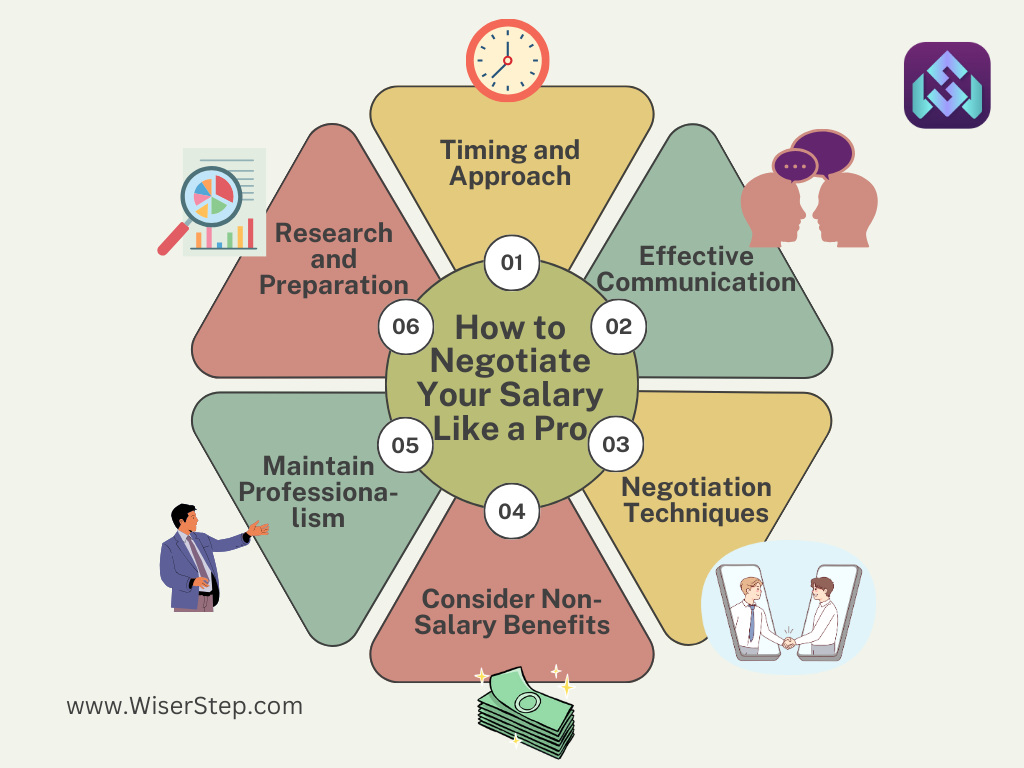Negotiating your salary can be one of the most nerve-wracking yet crucial conversations in your professional journey. Whether you’re starting a new job or seeking a raise or promotion, mastering the art of negotiation is key to ensuring fair compensation for your skills and contributions. Here’s a comprehensive guide on how to negotiate your salary like a pro.
Research and Preparation
Know Your Worth
Before the negotiation, research industry standards and salary ranges for your position. Websites like Glassdoor, Payscale, and LinkedIn can provide valuable insights into what others in similar roles are earning.
Assess Your Value
Evaluate your unique skills, experience, and accomplishments. Be prepared to articulate how your contributions align with the company’s goals and justify your request for a higher salary.
Consider the Entire Compensation Package
Salary isn’t the only component. Factor in benefits, bonuses, stock options, vacation days, and other perks when assessing the overall value of the offer.
Timing and Approach
Choose the Right Time: Timing matters. Initiate salary discussions after you’ve received a job offer or when you’ve achieved significant milestones or made noteworthy contributions within your current role.
Schedule a Meeting
Request a formal meeting with your employer or hiring manager to discuss your compensation. This allows both parties to focus solely on the conversation without distractions.
Effective Communication
Confidence is Key
Approach the negotiation with confidence. Highlight your achievements and the value you bring to the organization. Use specific examples to showcase your impact.
Be Realistic Yet Ambitious
Set a target salary range based on your research. Start negotiations at the higher end of this range, allowing room for compromise without undervaluing yourself.
Practice Active Listening
Pay attention to the employer’s response. Listen actively to understand their perspective and be prepared to counter any objections thoughtfully.
Negotiation Techniques
Focus on Value, Not Demands
Frame your requests based on the value you bring. Instead of demanding a higher salary, explain how investing in you will benefit the company.
Use the Power of Silence
After stating your desired salary, allow a moment of silence. This can prompt the other party to consider your proposal or make a counteroffer.
Consider Non-Salary Benefit
If the employer can’t meet your salary expectations, negotiate for other benefits like flexible work hours, additional vacation time, professional development opportunities, or a performance-based bonus structure.
Handling Counteroffers
Evaluate Counteroffers Carefully
If presented with a counteroffer, take time to review it thoroughly. Assess how it aligns with your career goals and financial needs.
Maintain Professionalism
Regardless of the outcome, maintain a positive and professional attitude. Express gratitude for the opportunity and keep the door open for future discussions.
Final Steps
Get it in Writing
Once you’ve reached an agreement, ensure that the terms discussed are documented in writing. This prevents misunderstandings or miscommunications later on.
Continue to Excel
After successful negotiations, continue to perform at a high level. Prove that the investment in you was worthwhile by delivering results and exceeding expectations.
Negotiating your salary requires preparation, confidence, and effective communication. By understanding your worth, approaching negotiations strategically, and focusing on value, you can navigate these discussions like a pro and secure a compensation package that reflects your skills and contributions. Remember, it’s not just about the money; it’s about advocating for yourself and your professional worth.


